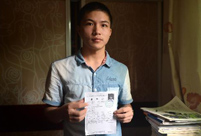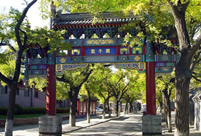 Global ambassadors of ecotourism gather in Nanjing
Global ambassadors of ecotourism gather in Nanjing
 Taiwan woman marries into Kazak family, 100 sheep plus a flat as dowry
Taiwan woman marries into Kazak family, 100 sheep plus a flat as dowry
 College girls take graduation photos under water in Chongqing
College girls take graduation photos under water in Chongqing
 Cartoon: Xi and football
Cartoon: Xi and football
 Chinese influence sweeps ROK
Chinese influence sweeps ROK
 Post-90s beauty boxer grapples four men
Post-90s beauty boxer grapples four men
 3,000-year-old tea town through lenses
3,000-year-old tea town through lenses
 22 archaeological sites along Silk Road in China
22 archaeological sites along Silk Road in China
 Football babies, Samba dancers embrace 'World Cup'
Football babies, Samba dancers embrace 'World Cup'
 Beautiful scenery along China’s Grand Canal
Beautiful scenery along China’s Grand Canal
BEIJING, July 8 -- China and the Republic of Korea (ROK) are working to ensure a breakthrough in their negotiation on a bilateral free trade agreement (FTA), likely paving the way for a larger FTA between all three leading economies in East Asia.
During his first visit to the ROK last week, Chinese President Xi Jinping pledged more efforts to accelerate the FTA negotiation so that it concludes by the end of the year, a sentiment echoed by his counterpart Park Geun-hye.
If all goes well, talks lasting over two years will finally come to an end in the second half of 2014 and bilateral trade will then be boosted to the promised 300 billion U.S. dollars in 2015.
Trade expert Mei Xinyu of the Ministry of Commerce said, "The most important aspect of Xi's visit will be promoting the negotiation."
A series of cooperative documents covering trade and currency were signed in the two-day state visit, laying the foundation for the FTA.
The most important of those was a memorandum of understanding between central banks of the two sides to establish a renminbi (RMB) clearing service in Seoul to facilitate trade and promote the use of RMB.
Under the memorandum, direct trading of the yuan against the won, the ROK's currency, will be achieved and an 80-billion-yuan (13 billion U.S. dollars) investment quota was granted to the ROK's institutional investors to invest in China's capital market.
The move marked the two sides' cooperation to deepen currency trading, which is good for the FTA, said Cai Hongbo of Beijing Normal University. Beijing and Seoul signed a currency swap agreement to bolster trade in 2008 and extended it in 2011.
Ahead of the FTA, the presidents also agreed to nurture cooperation in emerging industries such as new energy, intelligent manufacturing, environmental protection and the high-tech sector.
For Zhang Jianping of the foreign economic research institute at the National Development and Reform Commission, face-to-face discussion between the top leaderships will help resolve the sensitive matters that are holding things up.
Since May 2012, 11 rounds of talks have been conducted between the two countries on the FTA, with consensus reached on most of the issues, such as the proportion of merchandise enjoying a zero-tariff policy. The next round of talks is scheduled for later this month in the ROK.
Analysts expect that disagreements left in aspects including chemical sectors and agricultural products will be settled.
China and the ROK have experienced two decades of booming bilateral trade. Two-way trade surpassed 270 billion U.S. dollars in 2013, nearly 50 times the volume in 1992, making the ROK China's sixth-largest trade partner and third-largest source of imports.
As the world recovery falters, the FTA should be a profound and significant part of the two countries' future relations.
It would boost trade, investment and even GDP growth of the two economies. It would help the ROK reinforce its position in the Chinese market, as its weakening technological leverage allows in U.S. and European rivals, said Mei.
In 2013, around one fourth of ROK exports went to Chinese buyers, but the ratio has begun to drop. The ROK's businesses pinned their hopes on the FTA to help their products re-gather steam in the Chinese market.
As for China, apart from cheaper car and electronics imports for consumers, Liaodong Peninsula, the country's closest point to the ROK, will receive the most benefits from the FTA, with Korean investment in the peninsula expected to surge.
Mei said China, engaged in FTA talks around the world, expects a successful negotiation with its neighbor to set a good example for future talks.
China has signed 12 free trade agreements with countries or alliances including Switzerland, New Zealand and the Association of Southeast Asian Nations.
HOPES OF LARGER FTA
Wei Zhijiang, director of the ROK Research Institute under Sun Yat-sen University in south China's Guangdong Province, said the China-ROK FTA can push forward negotiation for a larger one that includes Japan in the plan.
In May, the China-Japan-ROK agreement for promotion, facilitation and protection of investment took effect, and this is widely believed to be a prelude to the foundation of an FTA between the three countries.
However, territorial and historical disputes between Japan and its two neighbors respectively have cast a shadow over the prospects. Latest evidence can be found in the shrinking direct investment from Japan to China, with the volume plunging 42.2 percent year on year during the January-May period.
The FTA of the three countries was first envisioned in 2002 and the negotiation started two years ago, with the process dawdling partly due to political issues and partly due to a less interested Japan.
The situation is likely to change now, however, as a China-ROK success may push Japan to be more involved or face losing the enormous Chinese market to ROK enterprises.
In the first five months of 2014, investment from the ROK to China soared 87.9 percent year on year. With favorable conditions brought by the bilateral FTA, a wide range of ROK-made products from automobiles to electronics are likely to become Chinese new favorites.
 'Seattle's soulmate' - -Pike Place Market
'Seattle's soulmate' - -Pike Place Market Human skeletons of more than 1,600 years old
Human skeletons of more than 1,600 years old BFA goddess poses for graduation photos
BFA goddess poses for graduation photos Separate college entrance exam
Separate college entrance exam Flash mob dance
Flash mob dance Featured hutongs in Beijing
Featured hutongs in Beijing Picturesque scenery of Ghost City
Picturesque scenery of Ghost City Female special assault team in training
Female special assault team in training Children attend First Writing Ceremony
Children attend First Writing Ceremony Chengdu police use social media to boost recruitment
Chengdu police use social media to boost recruitment Secrets unveiled in restoration of the 800-yr-old Buddha
Secrets unveiled in restoration of the 800-yr-old Buddha Heavenly path in Chongli grassland
Heavenly path in Chongli grassland Happy Birthday to "Yuanzai"
Happy Birthday to "Yuanzai" China's manned submersible Jiaolong opens to public
China's manned submersible Jiaolong opens to public Roast Duck Restaurant celebrates 150th anniversary
Roast Duck Restaurant celebrates 150th anniversaryDay|Week|Month